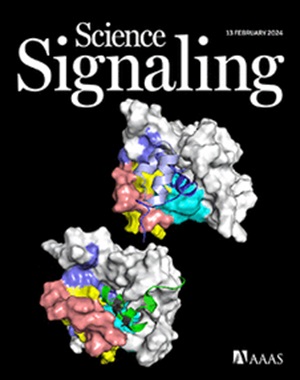PKCη错义突变增强高尔基定位信号,与隐性遗传家族性阿尔茨海默病有关
IF 6.6
1区 生物学
Q1 BIOCHEMISTRY & MOLECULAR BIOLOGY
引用次数: 0
摘要
阿尔茨海默病(AD)相关基因组变异的鉴定为疾病病因学提供了强有力的见解。阿尔茨海默病的全基因组关联研究(GWASs)已经成功地确定了以前未确定的靶点,但几乎完全使用了加性遗传模型。在这里,我们使用来自AD患者家庭的全基因组测序,对隐性遗传模型进行了基于家族的GWAS。我们发现AD风险与变异rs7161410之间存在关联,rs7161410位于PRKCH基因编码蛋白激酶C β (PKCη)的内含子中。此外,一种罕见的PRKCH错义突变K65R与rs7161410连锁不平衡,存在于rs7161410风险等位基因的纯合携带者中。体外分析表明,纯化变体的催化速率、脂质依赖性和肽底物结合与野生型激酶没有区别。然而,细胞研究表明,K65R PKCη变体降低了细胞质活性,相反,增强了高尔基体的定位和信号传导。此外,K65R变异改变了转染细胞中的相互作用网络,特别是与高尔基过程(如囊泡运输)相关的蛋白质。在人脑组织中,ad相关的rs7161410隐性基因型与PRKCH的表达增加有关,尤其是在杏仁核中。这种异常PKCη信号与AD的关联,以及对其功能如何改变的深入了解,可能会导致以前未发现的预防和治疗靶点。本文章由计算机程序翻译,如有差异,请以英文原文为准。
A PKCη missense mutation enhances Golgi-localized signaling and is associated with recessively inherited familial Alzheimer’s disease
The identification of Alzheimer’s disease (AD)–associated genomic variants has provided powerful insight into disease etiology. Genome-wide association studies (GWASs) of AD have successfully identified previously unidentified targets but have almost exclusively used additive genetic models. Here, we performed a family-based GWAS of a recessive inheritance model using whole-genome sequencing from families affected by AD. We found an association between AD risk and the variant rs7161410, which is located in an intron of the PRKCH gene encoding protein kinase C eta (PKCη). In addition, a rare PRKCH missense mutation, K65R, was in linkage disequilibrium with rs7161410 and was present in homozygous carriers of the rs7161410 risk allele. In vitro analysis revealed that the catalytic rate, lipid dependence, and peptide substrate binding of the purified variant were indistinguishable from those of the wild-type kinase. However, cellular studies revealed that the K65R PKCη variant had reduced cytosolic activity and, instead, enhanced localization and signaling at the Golgi. Moreover, the K65R variant had altered interaction networks in transfected cells, particularly with proteins involved in Golgi processes such as vesicle transport. In human brain tissue, the AD-associated recessive genotype of rs7161410 was associated with increased expression of PRKCH, particularly in the amygdala. This association of aberrant PKCη signaling with AD and the insight into how its function is altered may lead to previously unidentified therapeutic targets for prevention and treatment.
求助全文
通过发布文献求助,成功后即可免费获取论文全文。
去求助
来源期刊

Science Signaling
BIOCHEMISTRY & MOLECULAR BIOLOGY-CELL BIOLOGY
CiteScore
9.50
自引率
0.00%
发文量
148
审稿时长
3-8 weeks
期刊介绍:
"Science Signaling" is a reputable, peer-reviewed journal dedicated to the exploration of cell communication mechanisms, offering a comprehensive view of the intricate processes that govern cellular regulation. This journal, published weekly online by the American Association for the Advancement of Science (AAAS), is a go-to resource for the latest research in cell signaling and its various facets.
The journal's scope encompasses a broad range of topics, including the study of signaling networks, synthetic biology, systems biology, and the application of these findings in drug discovery. It also delves into the computational and modeling aspects of regulatory pathways, providing insights into how cells communicate and respond to their environment.
In addition to publishing full-length articles that report on groundbreaking research, "Science Signaling" also features reviews that synthesize current knowledge in the field, focus articles that highlight specific areas of interest, and editor-written highlights that draw attention to particularly significant studies. This mix of content ensures that the journal serves as a valuable resource for both researchers and professionals looking to stay abreast of the latest advancements in cell communication science.
 求助内容:
求助内容: 应助结果提醒方式:
应助结果提醒方式:


